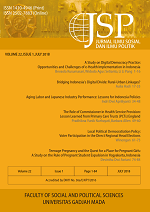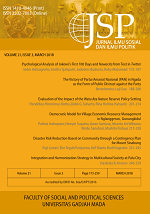Participation Dynamics of Voters Using ID Card in Local Elections: A Case Study of the 2015 Local Election in South Sulawesi
Andi Ahmad Yani(1*), Andi Yudha Yunus(2), Muhammad Iqbal Latief(3)
(1) Faculty of Social and Political Sciences, Hasanuddin University
(2) Faculty of Social and Political Sciences and Director of the Political Party Center, Pejuang Republik Indonesia University, Makassar
(3) Faculty of Social and Political Sciences, Hasanuddin University
(*) Corresponding Author
Abstract
The number of voters is an essential element in the legitimacy of a democratic regime. There are various factors that may influence voter turnout in elections; among other factors particularly is electoral management in voter’s registration. The problem of voters' data has always been a scourge in every general or local election due to poor population data management in Indonesia. Hence, the General Elections Commission (KPU) responded to this issue with a number of policies to increase the number of voter participation in all elections, especially for those who have not been registered properly. The Commission made a specific regulation to allow voters who were not registered in the voter lists (DPS) to use their ID card (KTP) or other legal documents in voting. This study used qualitative methods in five regions in the South Sulawesi Province that conducted the 2015 local election. This study explores the dynamics of voters using ID card or other legal documents by identifying their reasons and characteristics in using KTP as well as examining the responses of the local election institutions regarding this policy. This condition tends to apply to countries in the transitional period of democracy where the electoral administration system has not been properly regulated. The causes include the failure of administrative systems of management and population data collection with e-KTP card system in Indonesia.
Keywords
Full Text:
PDFReferences
Aminuddin, M. F. (2016). Electoral System and Party Dimension Assessment in Democratic Indonesia. Jurnal Ilmu Sosial dan Ilmu Politik, 20(1), 1-15. doi: 10.22146/jsp.17956
Blais, A., Massicotte, L., & A. Dobrzynska. (2003). Why is Turnout Higher in Some Countries than in Others?, Retrieved August 9, 2016, from http://www.elections.ca/res/ rec/part/tuh/TurnoutHigher.pdf
Bourne, P. A. (2010). Modelling Political Trust in a Developing Country. Research Journal of Social Sciences, 2(2), 84-98.
Endersby, J. W., & Krieckhaus, J. T. (2008). Turnout Around The Globe: The Influence of Electoral Institutions on National Voter Participation, 1972–2000. Electoral Studies, 27, 601–610.
Geys, B. (2006). Explaining Voter Turnout: a Review of Agregate-level Research. Electoral Studies, 25, 637-663.
Grönlund, K., & Setälä M. (2007). Political Trust, Satisfaction and Voter Turnout. Comparative European Politics, 5(4), 400– 422.
Grimmelikhuijsen, Stephan. (2012). Transparency and Trust; an Experimental Study of Online Disclosure and Trust in Government. A PhD Dissertation in Utrecht School of Governance. Netherlands: Universiteit Utrecht.
Hooghe, M., & Marien, S. (2013). A Comparative Analysis of The Relation Between Political Trust And Forms of Political Participation in Europe. Journal European Societies, 15(1), 131-152.
Institute for Democracy and Electoral Assistance. (2016). Voter Turnout Database. Retrieved February 18, 2017, from http://www.idea.int/themes/voter- turnout.
Lipset, S. M. (1981). Political Man: The Social Bases of Politics. Baltimore: The Johns Hopkins University Press.
Oliver, J. E. (2000). City Size and Civic Involvement in Metropolitan America. American Political Science Review, 94, 361-373.
Powell, G. B. (1982). Contemporary Democracies: Participation, Stability, and Violence. Cambridge: Harvard University Press.
Rolfe, M. (2012). Voter Turnout: A Social Theory of Political Participation. New York: Cambridge University Press
Solt, F. (2010). Does Economic Inequality Depress Electoral Participation? Testing the Schattschneider Hypothesis. Political Behavior, 32, 285–301.
Stockemer, D., LaMontagne, B., & Scruggs L. (2013). Bribes and Ballots: The Impact of Corruption on Voter Turnout in Democracies. International Political Science Review, 34(1).
Verba, S., & Norman H. N. (1972). Participation in America: Political Democracy and Social Equality. New York: Harper and Row.
Wong, T. K., Wan P., & Hsiao, H. M. (2011). The Bases of Political Trust in Six Sosian Societies: Institutional and Cultural Explanations Compared. International Political Science Review, 32(3), 263–281.
Wagner, A.F., Schneider , F., & Halla, M. (2009). The quality of institutions and satisfaction with democracy in Western Europe – A panel analysis. European Journal of Political Economy, 25(1), 30–41.
Yani, Andi A. (2015). The Dynamic of Indonesian Political Trust in the Beginning of Reform Era. Jurnal Penelitian Politik, 12(1), 55-68.
Article Metrics
Refbacks
- There are currently no refbacks.
Copyright (c) 2017 Jurnal Ilmu Sosial dan Ilmu Politik

This work is licensed under a Creative Commons Attribution-NonCommercial-NoDerivatives 4.0 International License.






















